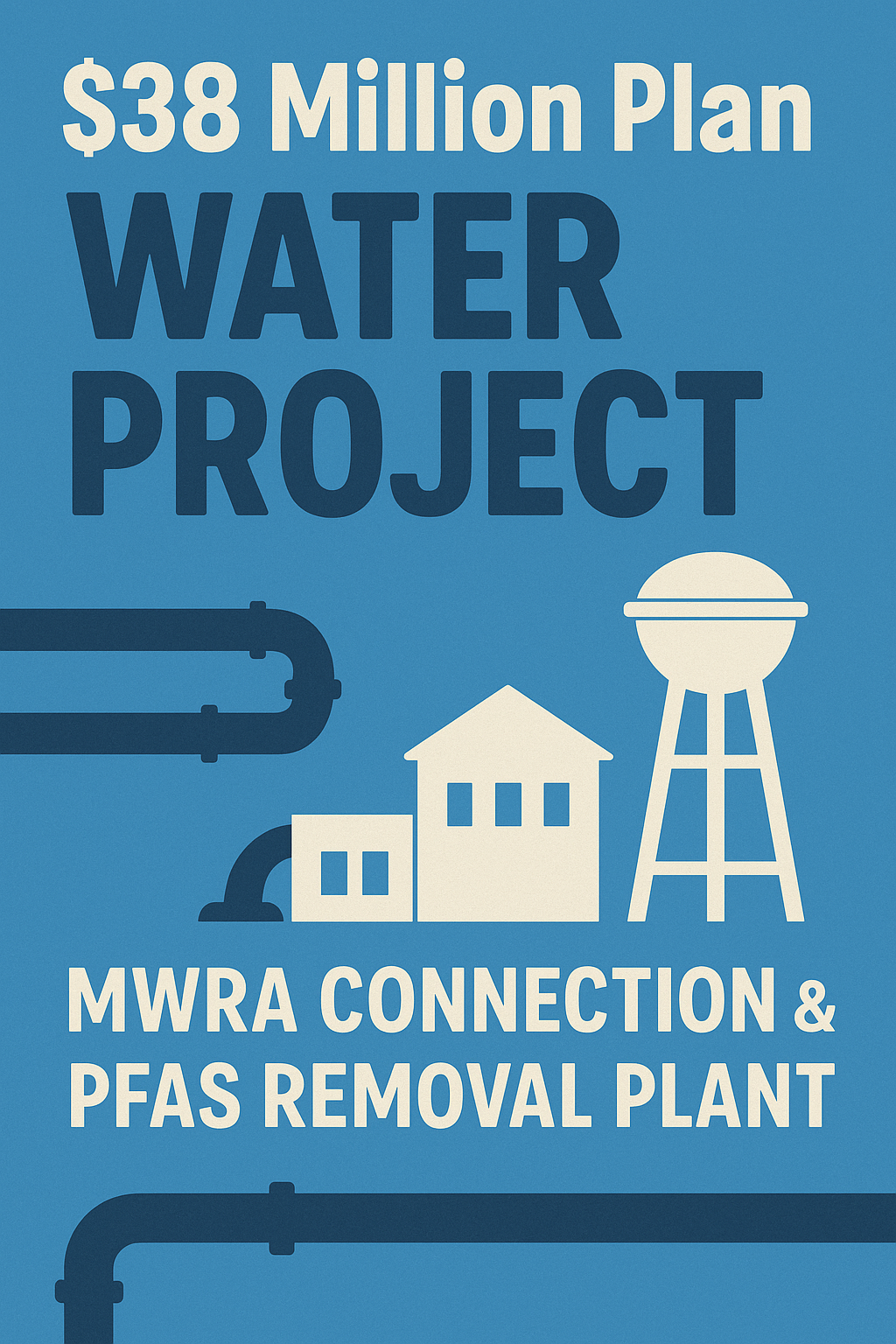The Board of Public Works voted on July 15 night to advance a $38 million plan that would permanently connect the town to the Massachusetts Water Resources Authority (MWRA) system and build a new PFAS removal plant at the Happy Hollow wellfield.
The Kleinfelder design team informed the board that it has completed 30% of the plans for the dual-source water project. The package calls for a 5,300‑foot, 20‑inch transmission main from MWRA’s Shaft L in Framingham, a three‑pump booster station on Castle Road rated at 3.5 million gallons a day, and 7,700 feet of 16‑inch distribution main on Old Connecticut Path. “We’ve built in a 20% design contingency and the 10% construction contingency required by the State Revolving Fund,” project manager Kirsten Ryan said.
Ryan put the preliminary price tag at $20.5 million for the MWRA connection and $14.2 million for the Happy Hollow treatment facility, which will house four granular-activated-carbon filters, chemical feed rooms, and a below-grade clear well. The board agreed that the larger pipes are sized so that Wayland can rely on MWRA water if Happy Hollow ever needs to be taken offline for maintenance, she added.
Newest main to remain
Chair George Uveges pressed the consultants to calculate how much of the 16‑inch main would have been replaced anyway under the town’s regular water main program. “People may come back and say that should be built into your water rates,” he said. Public Works Director Tom Holder noted the newest main in front of the high school will be left in place, lowering costs.
Funding dominated the discussion. Board members debated whether debt service should be borne by water users, real estate taxpayers, or a combination of both (see story on page 8). “Regardless of how the project is funded, town residents will still bear the cost,” said member Judy Haun‑Ping Ling. The board plans to deliver a formal recommendation to the Select Board before a joint session on Sept. 2, 2025.
Ryan said the team will file a project evaluation form with the Mass DEP Clean Water State Revolving Fund (SRF) by the end of the month and begin environmental permitting this summer. Construction would be bid in early 2027 and is expected to finish in 2029. Meanwhile, pilot testing of the GAC filters is set to begin this month.
The Board of Public Works voted on July 15 night to advance a $38 million plan that would permanently connect the town to the Massachusetts Water Resources Authority (MWRA) system and build a new PFAS removal plant at the Happy Hollow wellfield.
The Kleinfelder design team informed the board that it has completed 30% of the plans for the dual-source water project. The package calls for a 5,300‑foot, 20‑inch transmission main from MWRA’s Shaft L in Framingham, a three‑pump booster station on Castle Road rated at 3.5 million gallons a day, and 7,700 feet of 16‑inch distribution main on Old Connecticut Path. “We’ve built in a 20% design contingency and the 10% construction contingency required by the State Revolving Fund,” project manager Kirsten Ryan said.
Ryan put the preliminary price tag at $20.5 million for the MWRA connection and $14.2 million for the Happy Hollow treatment facility, which will house four granular-activated-carbon filters, chemical feed rooms, and a below-grade clear well. The board agreed that the larger pipes are sized so that Wayland can rely on MWRA water if Happy Hollow ever needs to be taken offline for maintenance, she added.
Newest main to remain
Chair George Uveges pressed the consultants to calculate how much of the 16‑inch main would have been replaced anyway under the town’s regular water main program. “People may come back and say that should be built into your water rates,” he said. Public Works Director Tom Holder noted the newest main in front of the high school will be left in place, lowering costs.
Funding dominated the discussion. Board members debated whether debt service should be borne by water users, real estate taxpayers, or a combination of both (see story on page 8). “Regardless of how the project is funded, town residents will still bear the cost,” said member Judy Haun‑Ping Ling. The board plans to deliver a formal recommendation to the Select Board before a joint session on Sept. 2, 2025.
















